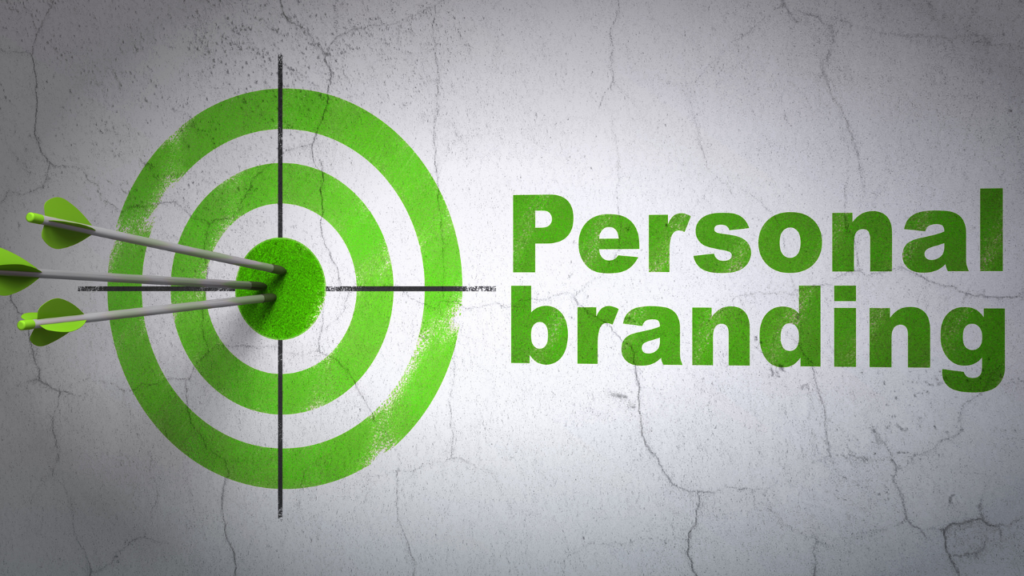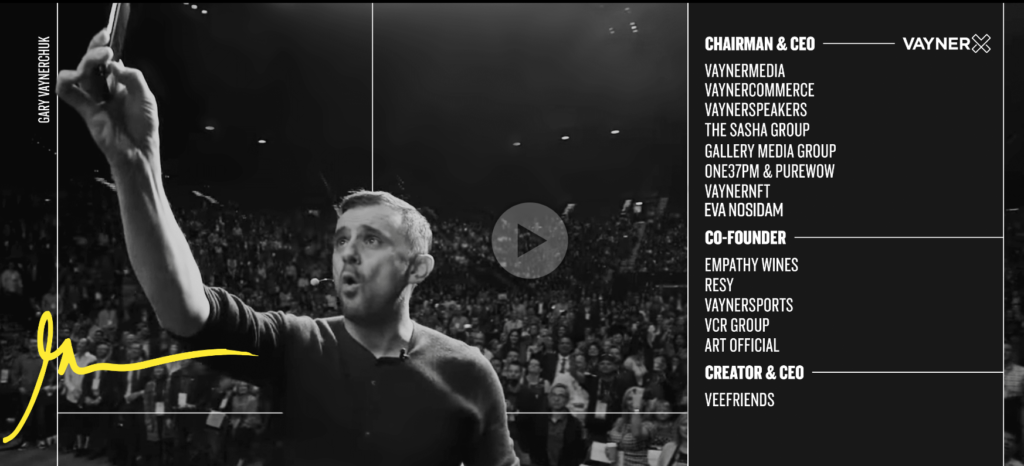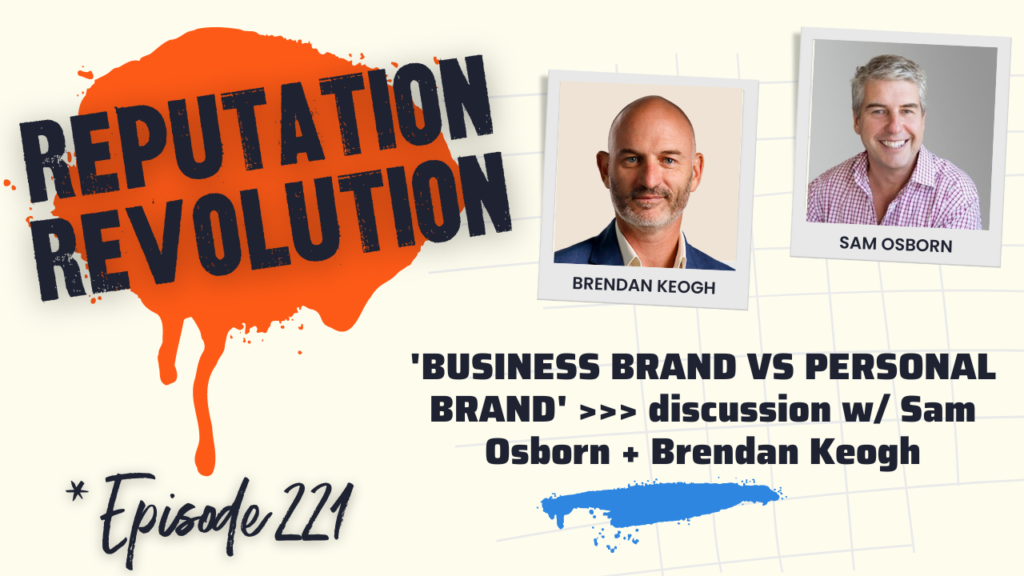
Should you focus your efforts on building your personal brand, or your business brand?
It’s a hot topic for people running their own business, especially when they are the business and everything revolves around their professional profile and reputation.
While there’s no cut-and-dried answer, it’s good to be aware of the various factors that may come into play and thus impact your decision which way to go.
But first …
After digging into this topic for many years now – plus having advised countless individuals – entrepreneurs, professional experts and thought leaders – on both their personal and business brands, I’ve come to a few conclusions about this particular topic.
As a rule, I tend to veer towards the idea of building your personal brand first, especially with the abundance of opportunities that come with being a leading influential voice in today’s ‘Reputation Economy’.
Having a strong personal profile and reputation in the marketplace plays a key role in numerous areas of business and professional life because it potentially can help you:
- ATTRACT customers and clients to your business (hopefully leading to increased leads and sales – this is particularly the case in B2B where the know-like-trust factor is critical)
- PIQUE the interest of possible employees (no small thing with the raging war for talent that’s a part of business life today)
- BUILD an army of allies, champions and enthusiasts of what it is you do, and what you stand for (in turn helping to create positive word-of-mouth buzz)
- SECURE interesting opportunities with third parties (i.e. business partnerships, project collaborations, advisory roles etc)
- CAPTURE the media’s interest, leading to myriad opportunities for valuable earned media exposure (this can extend to podcast interviews and speaking gigs, all of which can go a long way to building one’s profile)
- GAIN the attention of recruiters (or put you in the frame for internal promotions, should you work for a bigger organisation).
In short, I believe building a strong personal brand for all the right reasons, one that’s recognised as respected, is a business asset that will continue to pay dividends over the long haul.
That said, if you run your own business – one you want to grow and eventually sell – then building its brand is imperative. But I won’t go into too much detail on that right now; I prefer to lay out a few examples of people who have built powerful personal brands in their own right, and how things have played out for them against the backdrop of the ‘personal brand versus business brand’ argument.
The examples I cover are: Gary Vaynerchuk, Brian Clark, Cindy Gallop and Michael Hyatt.
Let’s go!
GARY VAYNERCHUK: Personal brand —> multiple business brands
As stated above, I sit in the camp of personal brand first, if nothing else because of the many opportunities that come with being well known and respected in the marketplace.
I think someone who’s managed to do this very successfully is Gary Vaynerchuk. Like him or not, Vaynerchuk’s name opens doors. He has a powerful personal brand.
Of course, it wasn’t always that way.
Back in the early days of YouTube and social media, Vaynerchuk was a nobody, just one of many would-be entrepreneurs plying their trade in obscurity.
Grabbing the reins of his father’s local New Jersey liquor store (then named Shoppers Discount Liquors, now Wine Library), he grew it from $3-60MM in sales during his tenure.
During his time at Wine Library, Vaynerchuk started one of the first long-form episodic video shows on YouTube in 2006 called WineLibraryTV. He produced an episode almost every day for five years, eventually landing him appearances on national TV with Ellen Degeneres and Conan O’Brien.
Vaynerchuk continued to elevate his profile, and then set about leveraging his brand by setting up a new social media agency business – Vaynermedia
This, from Vaynerchuk’s own website::
In 2009, after walking away from Wine Library TV, Gary and his brother AJ, who had recently graduated from college, founded VaynerMedia, an agency focused on helping large brands tell their stories on social media. Securing early clients like the New York Jets, and the NHL allowed them to scale at a rapid pace, outgrowing three offices, and scaling to over 500 employees in just six years. VaynerMedia now represents Fortune 500 clients like General Electric, Anheuser-Busch InBev, and Pepsi-Co, and recently announced their move to Hudson Yards, Manhattan’s hotly anticipated, multi-billion dollar development.
By the time he set up his own agency, Vaynerchuk’s name – his personal brand – was up in lights. Today, Vaynerchuk is involved in a bulging portfolio of businesses, but it was Vaynermedia that kicked off everything post-Wine Library.

Business brand or personal brand? My take ….
I can say with utter confidence that, had Vaynerchuk’s profile not been as big as it was at the time, there is no way Vaynermedia would have launched in the way it did, with big name clients, industry buzz and instant credibility.
In Vaynerchuk’s case, his personal brand acted as the vanguard. His various business interests, Vaynermedia included, have all benefited from his name and influence, with many of them now are paving their own way to branding success.
BRIAN CLARK: Building personal and business brands in tandem
Another interesting example of business vs personal brand is BRIAN CLARK, who has established and sold several 8-figure businesses, including StudioPress and Rainmaker Digital.
Clark, pictured below, is the founder of Copyblogger, the midlife personal growth newsletter Further, and Unemployable, an educational community that provides strategies for freelancers and solopreneurs. He is also co-founder of Copyblogger’s content marketing and SEO agency.

In the digital entrepreneurial world, Clark is big time: a legit player with consistent runs on the board, both in terms of content marketing and building digital businesses.
Interestingly, he’s not a fan of personal branding.
“I never concern myself with my ‘personal brand’. It’s far better to build something bigger than yourself. Then your personal brand will take care of itself.”
I don’t disagree with Clark, by the way. Being a content marketing pioneer, he’s all about consistently delivering value to a defined audience which, to me, is a key part of personal branding, so I’m not going to get into semantics here.
More so, it’s Clark’s philosophy of building something bigger than oneself that interests me.
In doing this, you’re creating something – a business entity – that becomes its own brand. This is why Clark has been able to sell several of his businesses for decent payouts, and then be able to walk away from them.
Worth noting, however, in Clark’s case his personal brand grew organically, in tandem with, his business brands. This, in turn, has enabled him to establish new ventures quickly because of his elevated profile and reputation, plus the fact he’s been able to build up a strong and devoted audience through his content.
While the businesses Clark was a partner in no doubt benefited from his status within the industry, they were strong enough brands to stand alone and from that perspective, were seen as ideal acquisitions for the companies that bought them.
Business brand or personal brand? My take ….
Two key takeaways from Brian Clark’s story:
(a) if you create something of note, that’s bigger than yourself, then invariably your personal brand will benefit (or as Clark says: “… your personal brand will work itself out just fine”). I want to emphasise, however, that content marketing is a critical factor and plays a major role here.
(b) If your goal is to grow and sell a business, then of course, building the business brand more so, or at least equally to your own personal brand, is an absolute must. Preferably, this is probably something you need an awareness of from the early days of the business.
CINDY GALLOP: The personal brand-based business in action!
Cindy Gallop pitches herself as the ‘Michael Bay of business’ because she likes to “blow shit up”. I love it!
She describes herself as a “brand and business innovator, consultant, coach and keynote speaker, available to work with anybody who wants to change the game in their particular sector”.
She says: “Come to me for radical, innovative, groundbreaking, transformative – I don’t do status quo.”
Cindy, pictured, is your classic personal brand-based enterprise. She is the business!

That doesn’t mean she hasn’t got other businesses or projects on the side (for example, she’s the Founder & CEO of MakeLoveNotPorn.TV, the “World’s 1st user-generated, human-curated #socialsex video sharing platform”).
But she is the speaker.
She is the consultant.
She is the coach.
She is the influencer available for suitable partnerships.
She is the brand.
Business brand or personal brand? My take ….
We’re seeing more and more of this business model today, where credible individuals build a strong and credible personal brand and then grow a portfolio business around it. Some have as many as 20 streams of income!
Others, like New York’s Kat Norton, operate under a personal brand ‘handle’ that effectively serves as both a business and a nickname. Kat is known as Miss Excel, who boasts 840,000+ followers on TikTok along with 610,000 followers on Instagram. She teaches Microsoft Excel to individuals, businesses, and educational institutions through her line of Excelerator Courses and customized group training sessions.
(Of course, you’ve also got an outlier like Seth Godin, ahead of his time as is his want, who has always thought of his career as a series of projects, not jobs).
Michael Hyatt & Full Focus: From personal brand to business brand
And finally, as a counter-balance to the examples above … we have the case study of US businessman-turned-blogger, Michael Hyatt, who is currently making the transition from personal to business brand.
Hyatt came to prominence around 2012 with the release of his book, ‘Platform: Get Noticed in a Noisy World’, which became a bit of a bible of personal branding at the time.
In those days, Hyatt’s business was very much about him. He was the brand: the speaker, the podcaster, the blogger, the author.
Then the name Michael Hyatt & Company became a bit more prominent. Michael was still integral to the business, but it was obvious it had become a bigger operation, and more than just Michael (for example, his daughter Megan Hyatt Miller also started taking centre stage a bit more).
Now, more recently, Michael Hyatt & Company has become Full Focus. It’s still a performance coaching company, but with a grander vision, backed by a growing team.
“At some point, I crossed the line where it was no longer about me. It’s about us,” Hyatt says about the change.
Hyatt’s recent transition puts perspective around the question of ‘personal brand vs business brand’. That said, his personal brand is well established and no doubt he’ll continue to sustain it in the marketplace. It’s just that these days, he’ll be leveraging it for the benefit of his rebranded company, Full Focus.
I think this quote from Hyatt sums things up nicely:
“If you want to build a company fast, do it on a foundation of a personal brand. If you want to build a company to last a long time, don’t do that.”
So, as you can see, there is no right or wrong. Just what’s right for you, your business and your future. And, of course, people evolve, as do businesses.
Things invariably change. The key is to have purpose and direction, and be flexible enough to change tack if and when that’s required.
Good luck!
Trevor 💪
Website | Twitter | LinkedIn | Podcast | Books
WANT MORE?
I’m back for a new season (#6) of the REPUTATION REVOLUTION podcast. In the latest episode, I tackle the ‘business brand vs personal brand’ debate alongside two experienced pros —
- SAM OSBORN – a leading brand strategist who helps businesses drive stronger revenue, branded communication and customer love
- BRENDAN KEOGH – a marketer and coach who helps thought leaders clarify their message and create cut-through content that gets results

If you’re building a business enterprise around your personal brand and want to dig even further into the ‘business brand vs personal brand’ topic, you might find this podcast conversation of value.
You can listen to it here, or via your favourite podcast app, including Apple Podcasts, Amazon Music and Spotify.



Leave a Reply